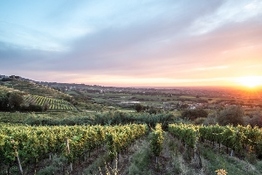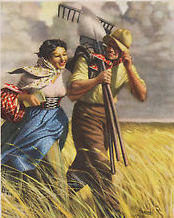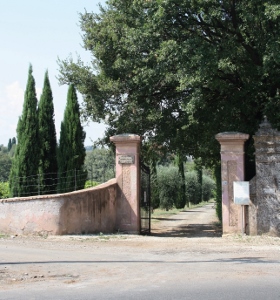 One of the incredible things about Italy is the way it can continue to surprise, how it can reserve those pockets of pleasure and wonder amongst the chaos where you least expect them. A bit like that tiny bubble of cold Frascati Spumante that bursts on the back of your hand as you reach for your glass, sending an orgasmic tingle up your warm arm. To me, the Principe Pallavicini Estate is a bit like that bubble. Every time I go through the gate on an anonymous bend just below Colonna, it feels like I’ve discovered my own time warp and I slip back through centuries to absolute peace. Here I find a perfume of green, of earth, of fruit and breezes coming from the sea to break through the haze around the walnut tree. How many centuries is hard to say. If I think of how long the fief has been in the Pallavicini family – that date 1670 that I can see impressed on the label of the Estate’s Malvasia Puntinata and Semillon Blend – I have images of fancy Baroque balls, of Cardinals in red, of an old Pope as cold as the marble that Bernini used to carve his Angels and pretty princesses in pearls entertaining guests beneath paintings of Rubens, Van Dyck, Il Grechetto et al in Scipione’s ex-Palace in Rome, itself built over the gutted ruins of Constantine’s baths. But when I look across to the ridge of the extinct volcanic crest, shielding Lake Albano and Diana’s mirror from my view, still dense with woods heavy with the scent of porcini, I can imagine a grinning, tipsy Bacchus, dancing around with his satyrs and nymphs, excited to have found his ideal vineyard, hundreds of thousands of years ago when time wasn’t measured. When I see the fragments of a by-way of the Roman Via Labicana, I’ve gone back to Roman legions marching off to plant vines in the south of France, ignoring the favour that they were doing to future Gauls. Or even to 496 BC and the splash of Latins and Etruscans being slayed by Roman allies Castor and Pollux, falling into Lake Regillus a couple of kilometres to the west. But then I catch a glimpse of the water tower on the nearest of our Castelli Romani towns, Colonna, and I can’t help thinking of Pietro born in ancient Frascati, Tusculum, crib of the Kings of Rome, medieval Popes and the most powerful nobility. Where Roman philosophers philosophised, their veritas was unravelled by rivers of local wines. In villas that were so decorative that they couldn’t survive Barbaric invasions, but left us with underground cisterns and aqueducts, where we now can age great reds or store Frascati DOCG’s. Still cool and damp as if the Roman fountains have only just finished draining their last bath. I look across to Monte Porzio, sitting on the hill in front of me and wonder whether Marcus Porcius Cato the elder realised when he wrote his treatise on agriculture (de Agricultura) or invented his wine press, how many tens upon tens of thousands of future farmers would count on his instructions. Or, if Cicero had any idea how looking for his villa on Tusculum would drive Napoleon’s brother Lucien so crazy. A red rose bush, at the head of a line of Malvasia del Lazio, evokes a puffy red shirt of the Garibaldini troops thinking they were doing Italy a favour by uniting the country, sitting in the Pallavicini Osteria awaiting their leader and Briganti crouching in ambush in the woods. The feel of the volcanic earth in my sandals, that familiar terroir that gives our Frascati wines its minerality and sapidity, and I think of Turner on his own Grand Tour wandering around in dusty boots with his sketch book and watercolours trying to capture my same feelings on a scrap of paper. Maybe Donna Maria Camilla would have commissioned him, to add to her already marvellous collection, or taken more lessons. The chatter of older ladies’ dialect echoes through the vines, sometimes their vulgar language surprises me, but makes me giggle, as if just because of their age they shouldn’t be thinking of sexy farmers. I think of their men going home after them, sweaty, tired and sleeplessly worried that the weather behaves, so as not to ruin a whole year’s toil. The agronomist chews the most precocious of the 20 types of grape, pulverising the seed between his teeth to see how long to wait till harvest. Grinning, satisfied with the sweet and acidic taste, he tosses back his white hair, wiping a drop of sweat from his wrinkled forehead at the same time. As he lunches on porchetta at the street kiosk with local labourers he declares proudly “what a great ‘annata’ it’s going to be this year, with 600,000 new offspring soon to be in the cellar”. Half of which are destined to grow up and become ambassadors to various corners of the World. Somehow all the pieces of the patchwork that has been the history of this place pours from the vats into the bottles, caressed along its way by the loving hands of Mauro the director, as if they were babies in need of a lullaby, but already great little Roman soldiers preparing to conquer. Pair any Pallavicini wine with your dreams.
9 Comments
 I’ll tell you this, but don’t get the wrong end of the stick, they weren’t poor, or needy. They were the people that reconstructed Italy after a terrible war and an even more terrible dictatorship. I’m talking about folk who defended taste and typicality…while modern progress and comfort advanced, they kept their country roots, (long before today’s consoling farmers’ markets and organic produce). These were the people that around our area, after the harvests, with good manners and dignity, would ask the land-owners if they could go ‘grazing’. I’ve met loads all over Italy, that picked corn after the combine harvesters had been through the fields, for their hens, so they would give lovely yolks, red like a sunset, and others that would collect shrivelled up, left-behind bunches of grapes for sharp but tasty wines. From north to south, crop to crop. The other day a couple knocked at the door of my farm, a lady and her husband, elderly but lively, cheery and hearty “can we collect the leftover olives, there's only a few but they're nice and juicy, over-looked by your pickers?” I could have hugged them, so tenaciously attached to their history, witnesses of a way of life that is simple but parsimonious and conscientious. In my positive answer there was gratitude towards these two survivors of compulsive consumerism, because from each of those olives a drop of a world that I loved would be squeezed. Here we are today looking and searching incessantly for something, without even remembering what it is exactly we are looking for. We should remember this real world fondly and take example. |
Easyfrascatia group of people, that have lived and experienced the wonderful atmosphere of Frascati for many years, and now wish to share it with you. Archives
March 2023
Categories
All
|
- Home
- Best Frascati Wine Tours 2024
-
Cookery course
- A Unique Day at Lake Nemi
- Online Wine Tasting course
- Getting around
- Travel Agent Information
- Wine Glossary Italian-English
- Expat notice board
- Blog
- Markets
- Contact
- Frascati Cooking That's Amore
- Risorse per le Cantine e Service Providers di Frascati
- Free Castelli Romani Guide book download
- Free Foodie's Guide of local recipes and typical products
- L'Olivella Wine Estate Shop
- Grapes in Frascati wines
- Frascati Wine Consortium
- Vinalia Roman wine festivals
- Wine Spectator Tasting Tips
- Tours in Rome
- Home
- Best Frascati Wine Tours 2024
-
Cookery course
- A Unique Day at Lake Nemi
- Online Wine Tasting course
- Getting around
- Travel Agent Information
- Wine Glossary Italian-English
- Expat notice board
- Blog
- Markets
- Contact
- Frascati Cooking That's Amore
- Risorse per le Cantine e Service Providers di Frascati
- Free Castelli Romani Guide book download
- Free Foodie's Guide of local recipes and typical products
- L'Olivella Wine Estate Shop
- Grapes in Frascati wines
- Frascati Wine Consortium
- Vinalia Roman wine festivals
- Wine Spectator Tasting Tips
- Tours in Rome
|
Copyright © easyfrascati.com 2023 |


 RSS Feed
RSS Feed
